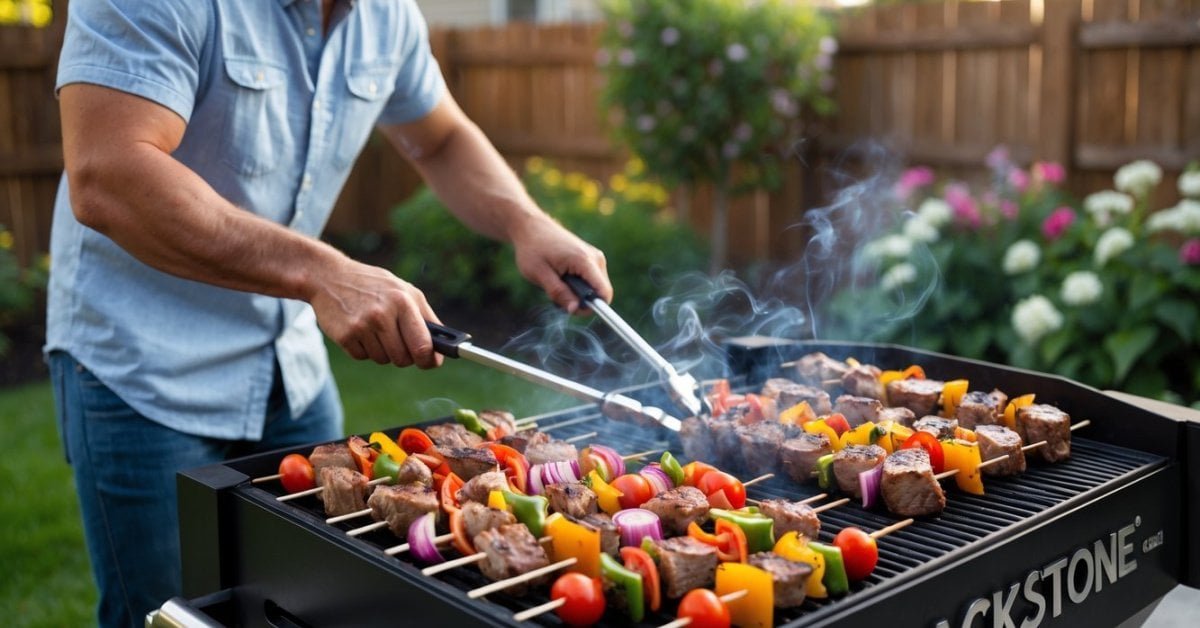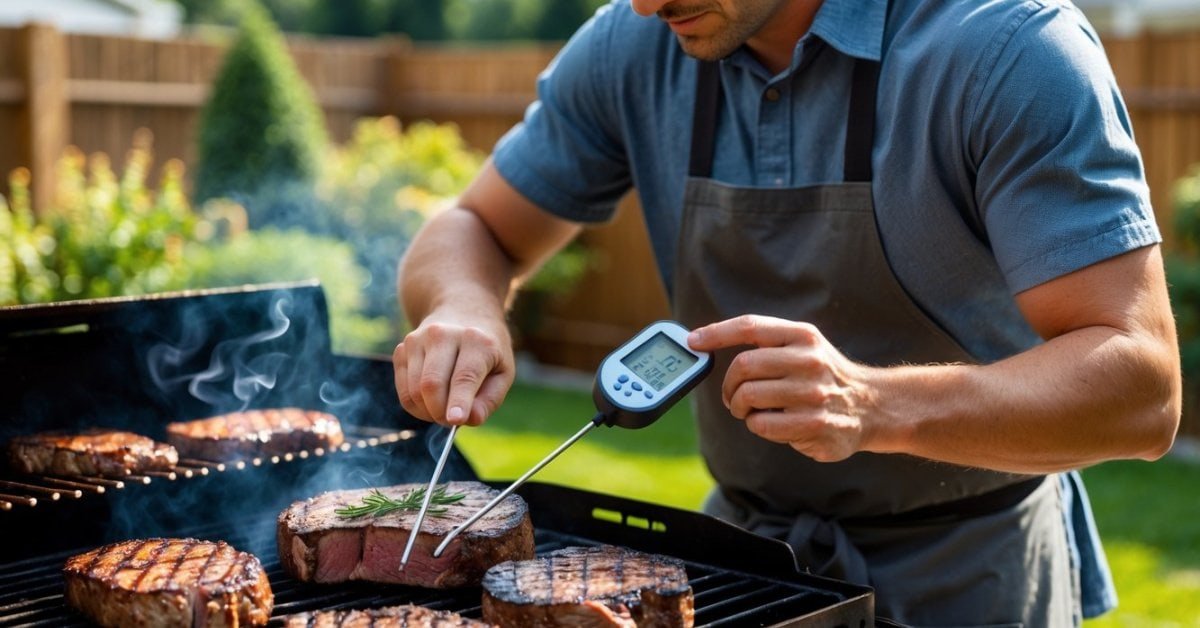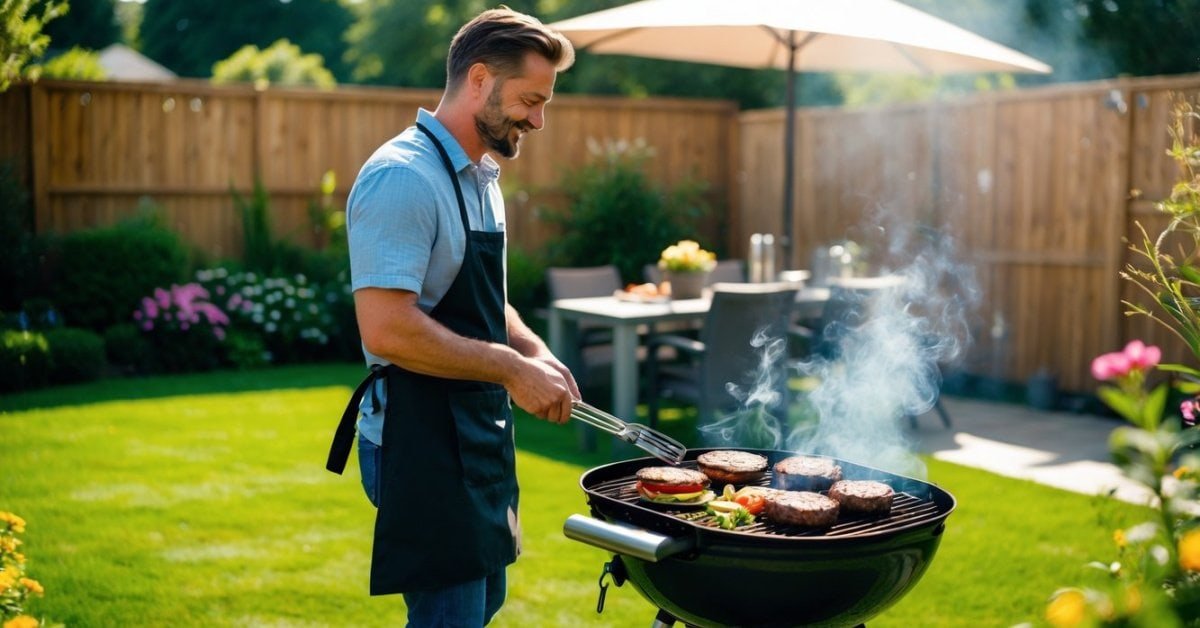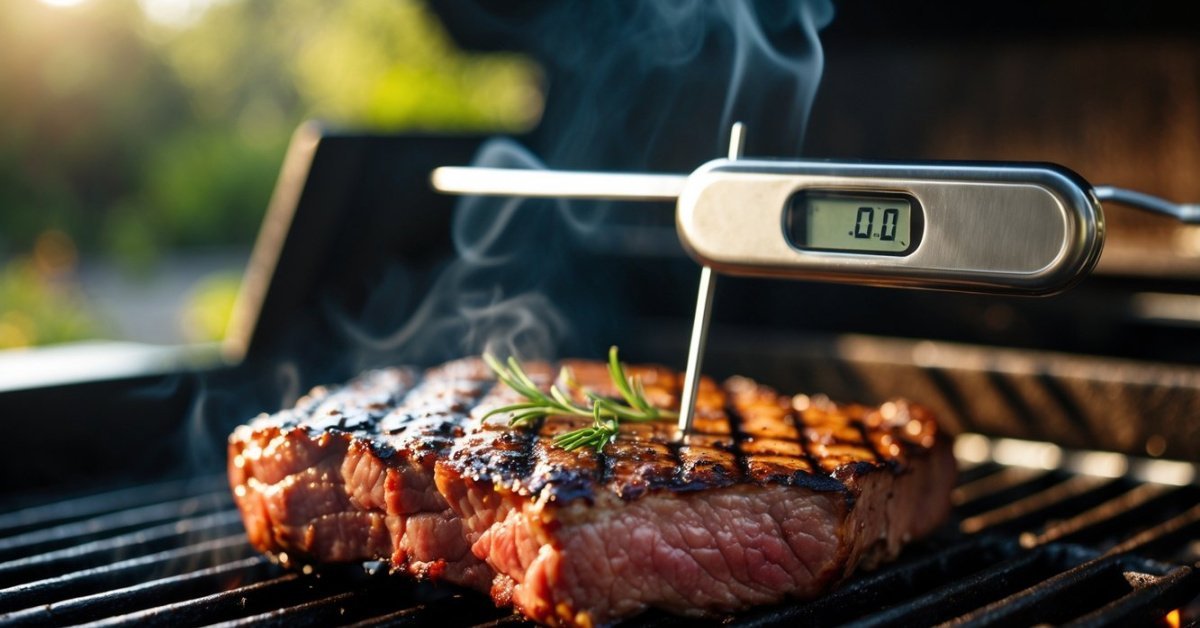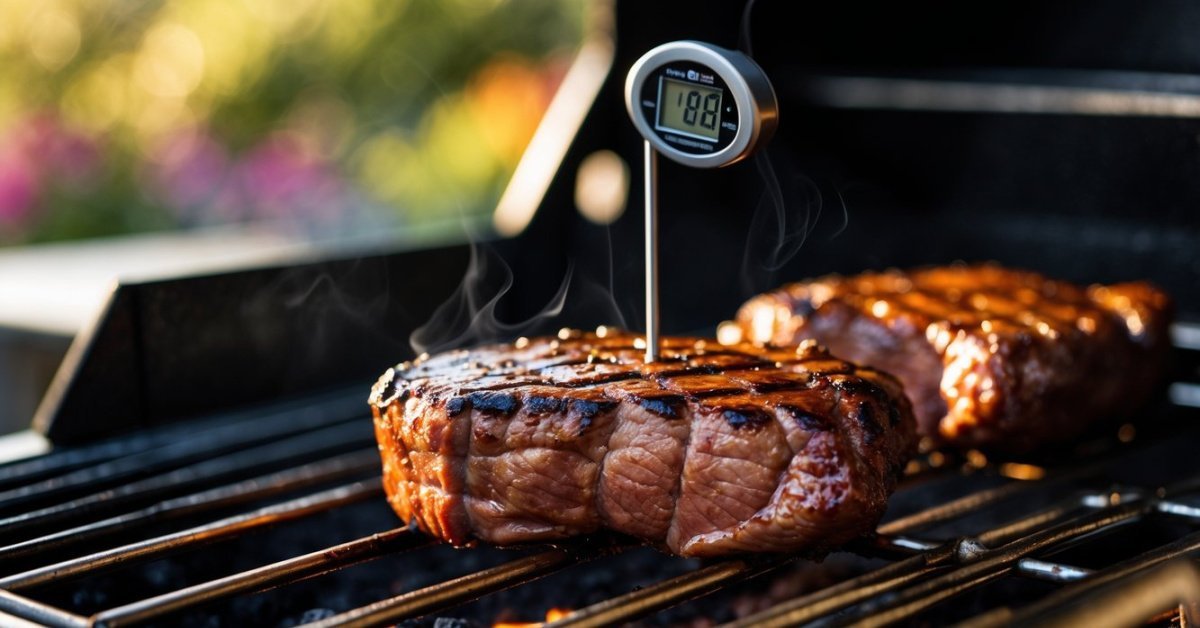Whenever I fire up the grill for a backyard cookout, I want everything to go smoothly. There’s nothing worse than guessing if the steak’s done or worrying about undercooked chicken. That’s where a reliable thermometer comes in handy.
But not just any thermometer will do. Outdoor grilling means dealing with unexpected rain, splashes from marinades and even the occasional drop into the sink. I’ve learned that a waterproof thermometer isn’t just a fancy upgrade—it’s a game changer for anyone who loves grilling outside.
The Importance of Accurate Temperature Control in Outdoor Grilling
Accurate temperature control in outdoor grilling changes the taste, texture, and safety of any dish I make. Even small differences in meat temperature impact its juiciness and doneness. For brisket, pork shoulder, or chicken, the right internal temp gives consistently juicy, tender results every time.
Precision helps me hit safe temperatures, especially with poultry and pork. According to the USDA, 165°F keeps grilled chicken safe, while pork stays best around 145°F. Undercooked meats risk illness, while overcooking dries everything out fast.
Reliable thermometers give me the confidence to grill thick steaks, pulled pork, or burgers without guesswork. When I ran my Texas bbq cart, fast readings meant quick service and happy customers—plus fewer wasted ingredients. Now at home, precision lets me replicate barbecue competition results or nail tricky reverse-sear techniques.
Fluctuating grill temps from wind or flare-ups make outdoor cooking less predictable than indoor ovens. Good thermometers—especially waterproof ones—keep me on track, whether it’s drizzling or the grill’s pumping out steam and smoke. This kind of control lets me focus on flavor and creativity instead of worrying about the basics.
Challenges of Outdoor Grilling Environments
Outdoor grilling isn’t just about heat and flames—weather, spills, and constant cleaning all play a part. I’ve seen how these factors can quickly ruin sensitive grilling gear, especially when it comes to thermometers.
Exposure to Weather Elements
Sudden rain, wind, or condensation often hits during a long cookout. My experiences in Texas showed how quickly humidity and summer storms could put regular thermometers out of commission. Outdoor grilling thermometers regularly face direct sunlight, splashes from pools, and drips from sweating drink glasses. Any non-waterproof unit quickly stops working or gives inaccurate readings when exposed to these elements.
Accidental Spills and Cleaning
Grilling sessions get messy—grease, sauces, and drinks spill all the time. At my bbq cart, I watched crew members scramble to clean up sugary glazes or splattered marinade on our gear. Cleaning becomes nonstop, especially when using thermometers between meats. Rapid dunking and scrubbing happen dozens of times per shift. Without a waterproof build, thermometers would short out, rust, or retain lingering odors from past cooks.
Key Features of Waterproof Thermometers
Waterproof thermometers bring real advantages to outdoor grilling. I’ve tested dozens and found that the right features make a difference, especially in unpredictable outdoor setups.
Durability and Longevity
Waterproof thermometers withstand outdoor stress much better than non-waterproof models. I see units labeled IP67 or higher take on heavy rain, grill-side spills, and high humidity without losing accuracy or function. When I ran my Texas BBQ cart, these tough thermometers handled daily bumps, drops, and cleaning cycles. Stainless steel probes paired with watertight casings keep electronics safe from rust, condensation, and grease—issues that ruined half a dozen non-waterproof models I tried. If the gear can’t handle a surprise downpour or a fall onto concrete, I don’t trust it for serious grilling.
Easy Maintenance and Cleaning
Easy cleaning helps a grilling thermometer last longer and stay reliable. I wash true waterproof units under running water, scrub off sauce, and wipe away grease without hesitation. I never worry about moisture sneaking into the electronics or clouding the display. This makes big difference at the end of a long smoke session—I’m finished cleaning in seconds while still meeting food safety standards. Thermometers with one-piece silicone seals and seamless bodies keep grime out and reduce buildup, making them my go-to for both backyard and event grilling.
Benefits of Using Waterproof Thermometers for Grilling
I rely on waterproof thermometers every time I fire up the grill, no matter what the weather throws at me. My experience running a busy Texas BBQ cart proved that these tools perform reliably where standard models fail.
Reliable Performance in All Conditions
Waterproof thermometers keep working through rain, humidity, and unexpected spills. In dozens of Texas storms, I’ve finished grilling brisket, ribs, and sausage without missing a single temperature reading. Whether it’s a backyard burger night or a cook-off by the lake, waterproof models don’t fog, short out, or corrode. Features like IP67 ratings, stainless steel probes, and silicone-sealed bodies hold up to cleaning, sauces, and open-flame mishaps. This ruggedness lets me grill with confidence and never worry about conditions ruining my gear.
Enhanced Food Safety and Quality
Waterproof thermometers help me achieve the exact doneness I want while reducing the risk of undercooked or dry food. Accurate, real-time readings mean I nail USDA-recommended temps for chicken (165°F), pork (145°F), and steaks (130–135°F for medium-rare). Even after dunking a thermometer to wash away grease or sauce, the waterproof design ensures reliable performance and spotless cleanliness. Consistent sanitation prevents cross-contamination—key for food safety—while keeping the device precise. These features let me focus on flavor and tenderness instead of equipment problems, which leads to safer, juicier barbecue every time.
Comparing Waterproof vs. Non-Waterproof Thermometers
Comparing waterproof thermometers to non-waterproof thermometers, I look at several factors that affect performance during outdoor grilling.
- Reliability in Outdoor Environments
Waterproof thermometers keep working even when exposed to rain, sauce splashes, and greasy hands, while non-waterproof options often fail after just one encounter with moisture or a typical barbecue mess. For example, my waterproof model survived a downpour at a Texas cookout, but three non-waterproof units died when hit by a jar of spilled brine.
- Ease of Cleaning
Waterproof thermometers get rinsed under the tap or wiped down after sticky rib sessions, but non-waterproof types require careful wiping to avoid damaging the internals. Grillers cleaning waterproof units save time, which is critical when working with multiple meats and high foot traffic.
- Accuracy Over Time
Waterproof thermometers maintain stable readings regardless of weather, thanks to sealed probes and casings. Non-waterproof designs can fog up, short out, or drift due to humidity, leading to off-target doneness or unsafe poultry, which I’ve experienced during Texas’s humid summers.
- Durability and Cost
Waterproof thermometers last seasons longer and handle drops and knocks from moving between pits and prep tables. Non-waterproof models crack, warp, or corrode after regular washes or a single rainstorm, resulting in more frequent replacements. Investing in one waterproof thermometer costs less over time due to its reliability.
- Food Safety and Consistency
Waterproof thermometers lower the risk of cross-contamination since they’re easy to sanitize between batches of pork shoulders or briskets. Non-waterproof devices pose a safety risk if moisture infiltrates the electronics, possibly giving false readings or failing mid-cook.
| Feature | Waterproof Thermometer Examples | Non-Waterproof Thermometer Examples |
|---|---|---|
| Survives Rain & Spills | IP67 digital probe, ThermoPop 2 | Standard analog, basic digital probe |
| Easy Cleaning | Dishwasher-safe digital | Hand-wipe only analog |
| Maintains Accuracy | Sealed sensor models | Non-sealed, exposed electronics |
| Durability | Stainless steel, silicone seal | Plastic body, snap-on covers |
| Food Safety | Quick sanitization, no gaps | Seam gaps, hard-to-clean electronics |
When I grill outdoors, waterproof thermometers let me focus on getting perfect bark on brisket or juicy chicken wings, instead of worrying about busted gear. For anyone serious about grilling, this difference becomes clear after the first storm or spill.
Top Tips for Choosing the Right Waterproof Thermometer
- Check for High IP Ratings
I look for thermometers labeled IP67 or higher, since this rating means the device keeps out dust and handles full water immersion without malfunctioning. Brands like ThermoWorks and Lavatools list IP ratings on their spec sheets for clarity.
- Prioritize Fast and Accurate Readings
I pick models that reach a stable reading in 2–3 seconds, since every second counts when flipping steaks or turning racks of ribs. For example, the Thermapen ONE gives a fast, precise temperature readout, which saves time and hassle at the grill.
- Pick Durable Probe Materials
I always choose thermometers with stainless steel or food-grade probes, because these don’t corrode or pit after repeated cleaning. Sharper probe tips, like those on the Lavatools Javelin, make it easy to insert even into thick brisket.
- Pick Large, Readable Displays
I value backlit or large LCD displays, which help me see temps clearly during night cooks or in bright Texas sunlight. Some models, such as the ThermoPro TP19, feature auto-rotating screens for added convenience.
- Look for Waterproof Buttons and Seals
I check for tightly sealed buttons and a one-piece silicone body, since gunk and moisture can get trapped in crevices during messy BBQ sessions. Smooth designs like the Kizen Instant Read reduce grime buildup.
- Consider Battery Life and Easy Replacement
I prefer thermometers with batteries lasting over 2,000 hours, and easily swappable units. This reduces downtime, which is crucial for long brisket or pork cooks where consistency matters.
- Test for Easy Cleaning
I make sure the entire unit can be safely rinsed or wiped clean without fear of moisture damage, which lets me keep the gear sanitary after barbecue sauce or grease wipes.
- Confirm Warranty and Support
I only buy thermometers from companies offering at least a 1-year warranty and responsive customer service, since outdoor gear takes a beating from weather and frequent use.
| Feature | Why It Matters | Example Models |
|---|---|---|
| IP67+ Rating | Full water protection, outdoor reliability | ThermoWorks Thermapen ONE |
| Fast Read Time | Efficient, accurate grilling without waiting | Lavatools Javelin PRO |
| Stainless Steel Probe | Corrosion resistance, safe for food | ThermoPro TP19 |
| Large Backlit Display | Easy to read in all lighting conditions | Kizen Instant Read |
| Seamless Body/Seal | Prevents grime and moisture inside thermometer | Lavatools Javelin PRO |
| Long Battery Life | Reduces mid-cook battery swaps | ThermoWorks Thermapen ONE |
| Easy Cleaning | Maintains sanitation quickly | Kizen Instant Read |
| Reliable Warranty | Protects your investment | ThermoPro TP19 |
Conclusion
When I’m out grilling—whether it’s a sunny afternoon or a rainy Texas evening—I never worry about my thermometer letting me down. A waterproof thermometer gives me the confidence to focus on perfecting flavor and texture without stressing over the elements or cleanup.
Once I made the switch to a waterproof model I noticed how much smoother and more enjoyable my grilling sessions became. It’s one of those upgrades that pays off every time I fire up the grill. If you love outdoor cooking as much as I do you won’t regret making this essential tool part of your setup.

